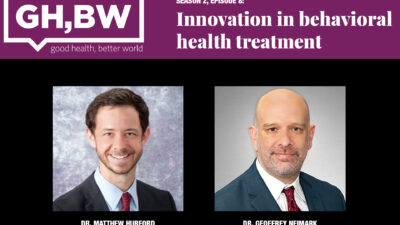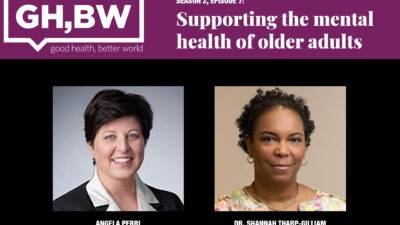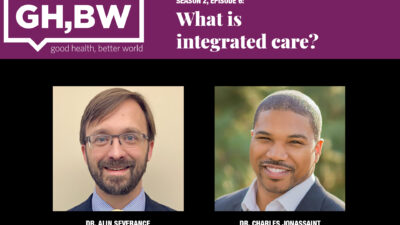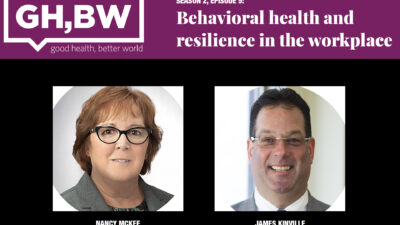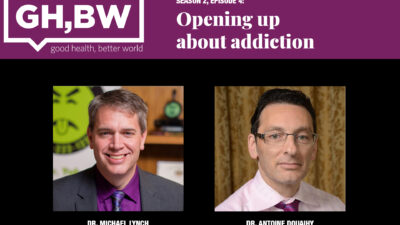So many factors influence the choices a person makes regarding their health.
Addressing these social factors often seems insurmountable. But with the right combination of knowledge, resources, and above all, trust, many organizations are beginning to make inroads. This includes insurers, like UPMC Health Plan, who are exploring new approaches that help support the “whole person” — which in theory can lead to fewer emergency room visits, reduce chronic health conditions, and lead to overall better health and wellness.
In Episode 8 of Good Health, Better World, we hear from Diane Holder, CEO of UPMC Health Plan and executive vice president at UPMC.
UPMC Health Plan serves nearly 4 million members across Pennsylvania.
Diane is a leading expert in healthcare delivery and financing who has held numerous senior executive positions in the industry and began her career in mental health services. She has a special interest in efforts that support those who are most vulnerable.
Read part of the conversation, here, then listen to the entire podcast, by clicking here.
What role that you think payers have in addressing social determinants of health?
Payers can have a fairly major role, but I think it's in partnership with others. One of the advantages that, when I look through the lens of a payer, we have the opportunity to look at broad populations. I notice differences in terms of what happens in a given neighborhood where a large group of our members might live.
You need to think about the social support infrastructure. That's different from person to person and community to community. You have to think about differences amongst groups.
How do we change some of the basic approaches based on the needs of the individual, but also what we know about the context of the world they're probably living in, and where can we partner with other community organizations to have some impact, and where can we bring our dollars to the table to make a difference.
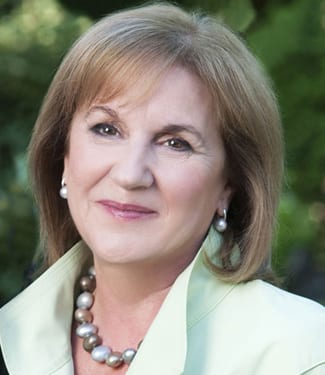
Has it been challenging to try to keep a public health perspective at the center of what we do?
I think that the balancing act is that there isn't enough money in the narrow healthcare dollar to correct all of the needs attached to things that drive health outcomes. I think part of what one has to do is recognize that a public health orientation is critically important — we have a responsibility for a population that we serve. And within that population, there are ways of thinking about making it better for all that are in our membership group to improve.
And that kind of orientation, I think, should never go away. But you have to be able to be realistic about where dollars can be spent and what difference they will make, and not use them foolishly. That's where I think partnership becomes increasingly important. So, if we know that the primary care groups in a region and the social services organizations in the community are seeing a lot of the same people — how do we work together to align our dollars and align our interests?
What are some of the partnerships that you think address these entrenched and really difficult problems related to social determinants of health?
The problem is great and the solutions have not been easy to find. We know that we have a higher rate of premature birth and infant mortality for the African-American population in our region than our white population. What would it take to increase the odds that people can get earlier prenatal care and get continuity of care following the birth of a baby?
I think what it takes is a combination of people who are willing to understand where people are coming from and what their needs are. So, if our health plan partners with our OBGYN treatment services, collectively, we can work with community-based services where we know that young mothers are often turning to get additional help and support for their children and their families.
And we have been working with HUD on housing. For a very long time, we've worked with some of the homeless services that are in Pittsburgh and working to establish lower and more affordable rent situations.
Is there anything else you would like to share about how we're addressing social determinants and influencers of health?
At that larger level, we are entering a new era and that much of what has to be done is having the political will to do it and finding the resources. I think they're there. The world is full of lots of examples of you get what you pay for. So, it’s a combination of looking at payment model reform, policy reform, and political will, at a community level, and understanding that the future of our nation really depends upon the healthy generation of children that will grow up and be productive adults.
So, I think there's an opportunity to bring together like-minded people who are willing to try to push to a new way of thinking.
We need to really begin to build between that health equity and that social equity that is so important in our country.
Listen to the rest of the conversation on the Good Health, Better World podcast.
This interview was edited for clarity and brevity.


